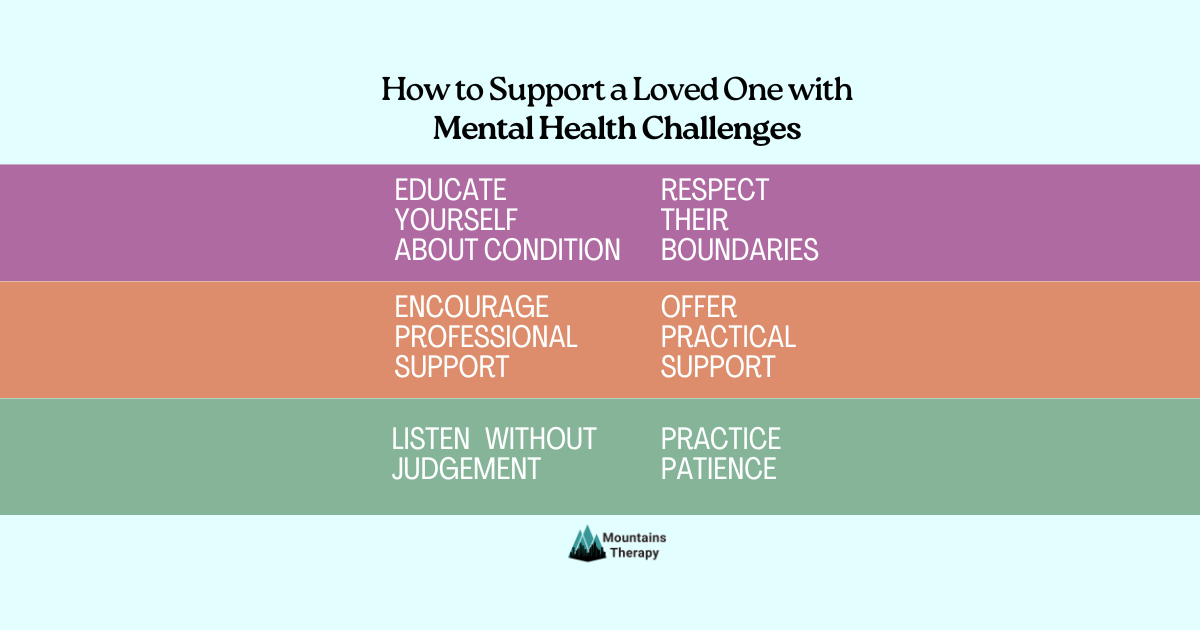How to Support a Loved One with Mental Health Challenges
Learn more about Counselings for individuals, couples and families here.
At Mountains Therapy, we know that supporting a loved one with mental health challenges can be both rewarding and challenging. It’s natural to feel unsure about how to help, especially when you want to offer comfort but may not fully understand what your loved one is going through. Whether they’re dealing with anxiety, depression, trauma, or another mental health condition, your support can make a significant difference in their journey toward healing. Here are a few practical steps you can take to offer meaningful support.
1. Educate Yourself About Their Condition
Knowledge is power when it comes to supporting someone with mental health issues. Learning about your loved one's specific condition can help you understand what they are experiencing and recognize potential triggers or signs that they may be struggling. You don't need to become an expert, but having a foundational understanding can lead to more compassionate and effective support.
- Resources: Consider reading books, articles, or visiting mental health websites like NAMI or Mountains Therapy’s blog to get reliable information.
- Conversation Starter: “I’ve been learning about [their condition]. How can I best support you right now?”
2. Listen Without Judgment
One of the most valuable things you can do is simply listen. Often, individuals with mental health struggles may feel isolated or misunderstood. Providing a safe space for them to talk about their feelings and challenges without fear of judgment can be incredibly healing. Avoid offering quick fixes or minimizing their experiences.
- Tips for Listening: Practice active listening by making eye contact, nodding, and paraphrasing what they’re saying to show understanding. Avoid interrupting or giving unsolicited advice unless they ask for it.
- Conversation Starter: “I’m here to listen if you want to talk. No judgment, just support.”
3. Encourage Professional Help
While your support is important, it’s essential that your loved one has access to professional mental health services. Gently encourage them to seek therapy or counseling if they haven’t already. At Mountains Therapy, we offer compassionate, tailored services, including individual therapy and couples therapy, to support those dealing with mental health challenges.
- Conversation Starter: “Have you thought about talking to a therapist? I can help you find one if you’d like.”
4. Respect Their Boundaries
Sometimes, when we want to help, we might overstep without realizing it. It’s important to respect your loved one’s boundaries, even if they prefer to have some space. Checking in regularly is important, but it’s equally important to allow them the time and space they need to process their emotions.
- Respecting Space: If they don’t feel like talking, respect that. Let them know that you're available whenever they’re ready.
- Conversation Starter: “I’m here whenever you’re ready to talk. No rush.”
5. Offer Practical Help
Mental health challenges can make daily tasks feel overwhelming. Offering practical assistance, like helping with errands, meals, or even providing a listening ear during appointments, can alleviate some of the stress.
- Examples: “Would it help if I picked up groceries for you this week?” or “Would you like me to drive you to your appointment?”
- Conversation Starter: “Is there something I can help you with today?”
6. Practice Patience
Recovery from mental health challenges can be a slow and nonlinear process. There will be good days and bad days, and your patience will go a long way in showing your loved one that you are in this with them for the long haul.
- Understanding Setbacks: Reassure them that setbacks are part of the journey, not a sign of failure.
- Conversation Starter: “I know it’s tough right now, but I believe in your strength. Take it one day at a time.”
7. Encourage Self-Care and Positive Coping
Help your loved one engage in self-care practices like exercise, mindfulness, or hobbies that bring them joy. While you can’t force them to do anything, you can gently encourage healthy habits that may lift their mood and provide emotional stability.
- Suggestions: You might suggest joining them for a walk, practicing mindfulness together, or doing something creative.
- Conversation Starter: “How about we take a walk together or try a relaxing activity?”
8. Take Care of Yourself
Supporting someone with mental health challenges can be emotionally taxing. It’s crucial to prioritize your own well-being as well. If you feel overwhelmed, consider speaking with a therapist or joining a support group. Remember, you can’t pour from an empty cup—taking care of yourself allows you to better care for your loved one.
- Self-Care Ideas: Engage in activities that rejuvenate you, such as exercise, meditation, or spending time with other supportive individuals.
- Conversation Starter: “I’m here for you, but I also need to make sure I’m okay so I can keep supporting you.”
Final Thoughts
Being there for someone facing mental health challenges requires empathy, patience, and a willingness to learn. At Mountains Therapy, we offer support not only to individuals but also to families and loved ones. If you or your loved one need professional guidance, consider reaching out for individual therapy or couples therapy today. Together, we can make the journey easier.











